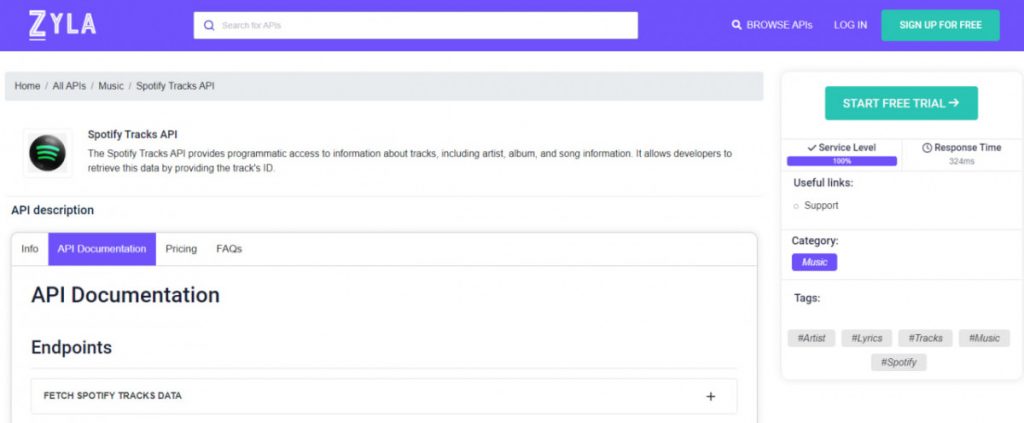In the dynamic world of music, developers seeking to create innovative music-related apps or websites require access to comprehensive metadata and lyrics for tracks. Fortunately, APIs have come to stay, and they offer powerful solutions, empowering developers to extract a wealth of information about tracks available on Spotify.
With their ability to provide essential metadata, including artist details, album information, and song data, APIs open up a world of possibilities for music-focused applications. In this article, we will explore the features and capabilities of one of these powerful tools and discuss how it can fuel the creation of engaging music-related platforms.
Spotify Tracks API serves as a programmable gateway to Spotify’s vast music catalog. By leveraging the unique track ID associated with each song, developers can tap into a treasure trove of data to enhance their applications. Whether you’re building a music discovery platform, a lyrics app, or a personalized playlist generator, Spotify Tracks API equips you with the necessary tools to elevate the user experience.

About The Benefits Of Spotify Tracks API
One of the most valuable aspects of Spotify Tracks API is its ability to retrieve extensive metadata for each track. With a simple query using the track ID, developers can gather crucial information about the artist, album, release date, duration, popularity, and more. This data enables developers to create rich, context-aware experiences and enhance the overall music discovery process.
By leveraging the metadata provided by Spotify Tracks API, developers can offer personalized recommendations and curated playlists based on user preferences. For example, an app can analyze an individual’s listening history, extract metadata from their favorite tracks, and provide tailored song suggestions, fostering an engaging and immersive music discovery journey.
Music enthusiasts often seek to dive into the lyrics of their favorite songs to understand their deeper meaning. Spotify Tracks API simplifies this process by providing developers with access to comprehensive lyric data. By integrating lyrics into their applications, developers can create lyric-centered experiences, such as karaoke apps or platforms that offer real-time lyrics synchronized with the music playback.
Spotify Tracks API enables developers to create music-centric social platforms, fostering collaboration and engagement among users. By leveraging the rich track information available, developers can build features that allow users to share and discuss their favorite songs, create playlists together, or even participate in crowd-sourced lyric annotations. The API empowers developers to transform their platforms into vibrant communities that revolve around a shared love for music.
How Does This API Work?
All the functionalities provided by Spotify Tracks API need a tracking ID to function. After the said ID is provided, the API then delivers its response. One of the possible endpoints for Spotify Tracks API is “Fetch Spotify Tracks Data”, which allows developers to retrieve general information about a specific track on Spotify. It also displays information about the album it was released into. In the following example, the API was provided with the code for the song “Island In The Sun”, performed by Weezer:
{
"tracks": [
{
"album": {
"album_type": "album",
"artists": [
{
"external_urls": {
"spotify": "https://open.spotify.com/artist/3jOstUTkEu2JkjvRdBA5Gu"
},
"id": "3jOstUTkEu2JkjvRdBA5Gu",
"name": "Weezer",
"type": "artist",
"uri": "spotify:artist:3jOstUTkEu2JkjvRdBA5Gu"
}
],
"external_urls": {
"spotify": "https://open.spotify.com/album/2OBSz5Nlto0Q5CtYPzPY7c"
},
"id": "2OBSz5Nlto0Q5CtYPzPY7c",
"images": [
{
"height": 640,
"url": "https://i.scdn.co/image/ab67616d0000b2731e0dc5baaabda304b0ad1815",
"width": 640
},
{
"height": 300,
"url": "https://i.scdn.co/image/ab67616d00001e021e0dc5baaabda304b0ad1815",
"width": 300
},
{
"height": 64,
"url": "https://i.scdn.co/image/ab67616d000048511e0dc5baaabda304b0ad1815",
"width": 64
}
],
"is_playable": true,
"name": "Weezer",
"release_date": "2001-05-15",
"release_date_precision": "day",
"total_tracks": 10,
"type": "album",
"uri": "spotify:album:2OBSz5Nlto0Q5CtYPzPY7c"
},
"artists": [
{
"external_urls": {
"spotify": "https://open.spotify.com/artist/3jOstUTkEu2JkjvRdBA5Gu"
},
"id": "3jOstUTkEu2JkjvRdBA5Gu",
"name": "Weezer",
"type": "artist",
"uri": "spotify:artist:3jOstUTkEu2JkjvRdBA5Gu"
}
],
"disc_number": 1,
"duration_ms": 200306,
"explicit": false,
"external_ids": {
"isrc": "USIR10110358"
},
"external_urls": {
"spotify": "https://open.spotify.com/track/2MLHyLy5z5l5YRp7momlgw"
},
"id": "2MLHyLy5z5l5YRp7momlgw",
"is_local": false,
"is_playable": true,
"name": "Island In The Sun",
"popularity": 82,
"preview_url": "https://p.scdn.co/mp3-preview/521139742aef149a3d58924c1e9dd6f1ff6b816a?cid=d8a5ed958d274c2e8ee717e6a4b0971d",
"track_number": 4,
"type": "track",
"uri": "spotify:track:2MLHyLy5z5l5YRp7momlgw"
}
]
}How Can I Get This API?
Spotify Tracks API is a powerful resource that offers developers an array of tools to extract comprehensive metadata and lyrics from tracks available on Spotify. By leveraging this API, developers can unlock a new dimension of creativity, enhancing music-related apps and websites with personalized recommendations, lyric-centered experiences, collaborative communities, and insightful music analysis.
With this powerful tool at their disposal, developers can bring their music-related visions to life, creating captivating platforms that resonate with music lovers around the world. You can try Spotify Tracks API by following these instructions:

1- Go to www.zylalabs.com and search for “Spotify Tracks API“, then click on the “Start Free Trial” button to start using the API.
2- Register and choose the plan that suits you best, you can cancel it whenever you want, even at the end of the free trial.
3- Once you find the endpoint you need, make the API call by clicking the “run” button and you will see the results on your screen. You can also choose the programming language of your choice and the response will be given in the friendly JSON format.

